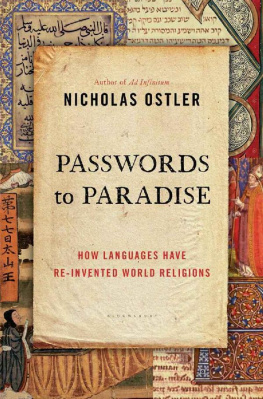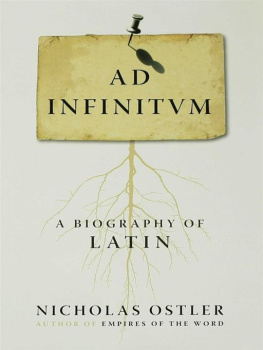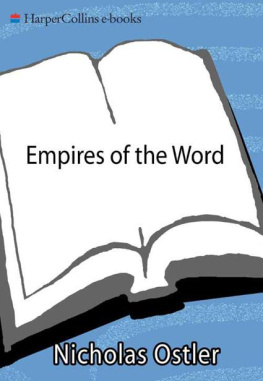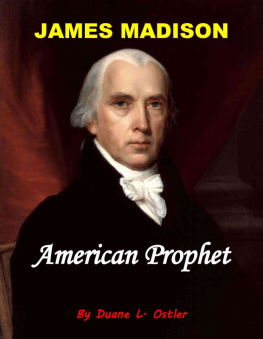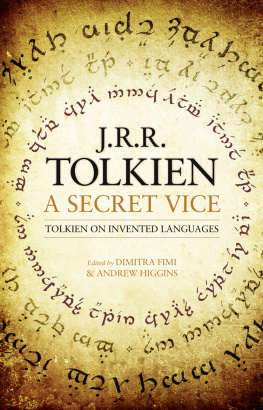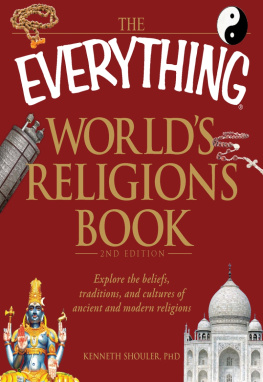Nicholas Ostler - Passwords to paradise : how languages have re-invented the worlds religions
Here you can read online Nicholas Ostler - Passwords to paradise : how languages have re-invented the worlds religions full text of the book (entire story) in english for free. Download pdf and epub, get meaning, cover and reviews about this ebook. year: 2016, publisher: Bloomsbury Press, genre: Religion. Description of the work, (preface) as well as reviews are available. Best literature library LitArk.com created for fans of good reading and offers a wide selection of genres:
Romance novel
Science fiction
Adventure
Detective
Science
History
Home and family
Prose
Art
Politics
Computer
Non-fiction
Religion
Business
Children
Humor
Choose a favorite category and find really read worthwhile books. Enjoy immersion in the world of imagination, feel the emotions of the characters or learn something new for yourself, make an fascinating discovery.
- Book:Passwords to paradise : how languages have re-invented the worlds religions
- Author:
- Publisher:Bloomsbury Press
- Genre:
- Year:2016
- Rating:4 / 5
- Favourites:Add to favourites
- Your mark:
- 80
- 1
- 2
- 3
- 4
- 5
Passwords to paradise : how languages have re-invented the worlds religions: summary, description and annotation
We offer to read an annotation, description, summary or preface (depends on what the author of the book "Passwords to paradise : how languages have re-invented the worlds religions" wrote himself). If you haven't found the necessary information about the book — write in the comments, we will try to find it.
Passwords to paradise : how languages have re-invented the worlds religions — read online for free the complete book (whole text) full work
Below is the text of the book, divided by pages. System saving the place of the last page read, allows you to conveniently read the book "Passwords to paradise : how languages have re-invented the worlds religions" online for free, without having to search again every time where you left off. Put a bookmark, and you can go to the page where you finished reading at any time.
Font size:
Interval:
Bookmark:
For my daughter,
Sophia,
true to her name
BY THE SAME AUTHOR
Empires of the World
Ad Infinitum
The Last Lingua Franca

| Tikaychiyqa | Honeycomb |
| uqaqch ninkichis kay qhilqasqayta, | He wrote all this, I hear you say. |
| mana uqaqchu, amawtakunaqmi; | No way. The learned scribes, |
| paykuna ari wanquyru jina | like bees, have made |
| miskichirqanku. | the honey in it. |
| Kay miskitaqa tikayachirqanku | This honey that you taste was wrought |
| jamutayninwan wanquyrukuna; | by bees with expertise; |
| qullanan tikanmantari chhumqaspa | discerning flowers |
| tikayachirqan. | they brought their harvest. |
| uqapis ari miskinta chhumqaspa | I forage too, and honey-fed |
| qankunaqta ari mikuchillaykis; | I try to bring you food. |
| maymantaraqmi uqa yachakuyman | Were it not so, |
| tikayachiyta? | What could I offer? |
| Kay tikayachiyqa amawtakunaqmi, | Such honey by the wise alone |
| mana rikrayqa chhikata phawanchu. | is made. Id never fly |
| Tikankunata pallanallaypaq | So high; Im more |
| chuspillan kani. | a buzzing midget. |
| Mikhullaychik ari, yachakuqkuna, | If you have thirst, then drink your fill; |
| miskisuptiykiqa yupaychallankis. | these sweets can power your mind. |
| uqallapaqqa puchullawanmi | But just for me |
| yachakunalla. | theyre too abundant. |
Juan de Figueredo
For one who grew up in the mid-twentieth century, the attractive power of revealed religions in the present era has come as an utter surprise.
I should make my standpoint clear: I received a Christian education in the Church of England, with thorough attention to the clearer parts of the Bible and occasional access to the ecstatic during Billy Grahams London crusades. At school, without choice, I attended a formal service of worship every day. But ultimately, I was not converted. The spiritual crisis of my mid-teens receded like a fever overcome, and I relapsed, like most of Europe and northern Asia, into nonspirituality. If anything, I found Christianitys spiritual claims both incoherent, and rather arrogant. A little later, I found out that my fatherwho had sent all his children for a good Christian upbringinghimself lacked faith. Later still, through an inspired birthday present from my wife, I discovered a closer kind of spirit in poetry, myth, and ancient cults of nature. But in the secular society of the West, as much in U.S. universities as European ones, I found that God was no longer a serious issue. Devotion to a creed and regular worship were things of the past. Yet what a past they had given to us Europeans!
Today, however, religions are experiencing a fresh influx of energy and growth in every continent but Europe. The big winners are Buddhism, Christianity, and Islam, precisely the missionary faiths that I discuss in this book. The yearning to belong to a largescale holy community has trumped all other senseand sensibility.
This curious demographic success of religion makes it clear that its basis is not practical, scientific, or philosophical. Something else is drawing people in, showing that people have other motives for adopting a faith. But if religion is to be taken seriously regardless of reason, and even of ethics, it becomes doubly hard to refute the cults of shame and murder that have recently come to the fore in extreme sects within the ancient missionary faiths. If we must accept respectfully that some find their truth in scriptures, who is to distinguish between texts that are clear, beneficent, and fruitful, and others that are misleading, even disastrous, if taken seriously?
Missionary religion, consciously preached in order to gain converts, is nothing new in the civilized world: it is at least two and a half millennia old and seems to have the means to renew itself, even in a generation when science based on evidence has revealed an almost unimaginable depth in the worlds past, and the basis of all terrestrial life in genetic codes. Despite the profundity of these new discoveries, the creeds that missionaries put across are, in many cases, older than the languages that are now used to expound, spread, and celebrate them. (Language change is thus revealed as a faster process than religious change.)
But where do those competing and ever so serious creeds come from?
We cannot study the origin of any religious creed directly. But it occurred to me that a new path to understanding the development of faiths and religious communities might be found in examining how a religion is affected when spread from one language group to another. This is a requirement for any missionary religion that aspires to global status; and all of them do. Each, after all, proposes a universal truth of value to all humanity. Somehow, a faith must retain its charisma as it is recast in the languages of new communities, with no natural limit to this process, as it crosses one linguistic boundary after another.
This book is the result of that investigation. Writing it has not been easy, and it is hard for me to say why. A kind of structure did soon emerge to characterize the various kinds of effects to look for as faiths were converted to new languages. But the faiths themselves resist classification or outlining, each having a very different central message. To this, new doctrines may be added, but each faith refuses any admission that its essence has changed. While the past histories of converted populations, mediated through their linguistic memories, do color their new reality as parts of a global church, it is easier to see the social effects on the community than to be sure of lasting influence on the faith itself.
Still, while humanity holds to a bewildering variety of mother tongues, we can look for those tongues different resonances in the realm of the spirit. This is, after all, an aspect of human life not constrained by our day-to-day views of the physical and social world. The linguist Benjamin Lee Whorf contended that language conditions thought. If it is true anywhere, it should be true in our spiritual world.
At the same time, spiritual truths are felt to be more profound than anything else we know. And so when expressing religious claims, diversity comes up against unity: diversity of expression in language reflects the insights derived from peoples previous adventures before being converted, while unity of revelationinevitably delivered by a prophet in a single given language, whether it be Pali, Aramaic, or Arabicis the fundamental raison dtre of each of the great missionary faiths.
How have missionary faiths solved the paradox in order to present a single, universal truth, yet in so doing, persuade peoples so diverse in their thoughts? Could they, in some cases, have supplemented the unitary original with extra ideas favored by their new congregations? The reader will have to judge.

I owe many debts of gratitude for aid received in this quest over at least five years. The first germ of the idea came from my colleague in the Foundation for Endangered Languages, the computational linguist Steven Krauwer. Since the early days when the project was known as Swords of Faith, it has been discussed first with my agent, Natasha Fairweather, and later with publisher George Gibson, and has certainly benefited from their tempering fire and formative hammering, not to mention the occasional dousing in cold water. The steady, encouraging faith of my wife, Jane, and of my daughter, Sophia, have also sustained me, as the chapters took shape and the swords were drawn from the stone.
Next pageFont size:
Interval:
Bookmark:
Similar books «Passwords to paradise : how languages have re-invented the worlds religions»
Look at similar books to Passwords to paradise : how languages have re-invented the worlds religions. We have selected literature similar in name and meaning in the hope of providing readers with more options to find new, interesting, not yet read works.
Discussion, reviews of the book Passwords to paradise : how languages have re-invented the worlds religions and just readers' own opinions. Leave your comments, write what you think about the work, its meaning or the main characters. Specify what exactly you liked and what you didn't like, and why you think so.

